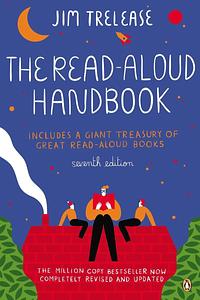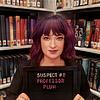You need to sign in or sign up before continuing.
Take a photo of a barcode or cover
The first half of the book is a real treasure for new parents, I think . . . why to read aloud, when to read aloud, the do's and don'ts, the print climate . . . the second half is the Treasury. I've found it helpful, particularly for ideas for gifts, though too limited in scope.
Someone gave me this book as a baby gift, and I am so thankful! I will definitely be giving with baby shower gifts in the future.
Helpful info that most of us probably assumed, but research to show just how MUCH reading really matters in preparing for school and advancing later.
I read about half of it and skipped around on the second half, but will definitely keep this as a reference book.
Helpful info that most of us probably assumed, but research to show just how MUCH reading really matters in preparing for school and advancing later.
I read about half of it and skipped around on the second half, but will definitely keep this as a reference book.
I read this book for a class, and let me tell you... it isn't worth your time of day unless you have to read this for a class.
This book is opinionated without providing reliable sources (it cites .COM WEBPAGES AND EDITORIAL NEWS ARTICLES, HELLO???), and Trelease spends most of the first half talking down to working class parents while also being very anti-technology for what seems to be archaic reasons. This book reads like an old man's death knell of "THINGS WILL NEVER BE GREAT AGAIN! KIDS THESE DAYS DON'T READ, AND ALL THEY WANNA DO IS WATCH TV AND PLAY VIDEOGAMES."
This book is only worth your money for the incredible bibliography in the back that gives great books to read to your young one. That is the only reason this garbage gets an extra star.
Summary of this book:
1. Read to your kids, it will help their literacy skills, language skills, and creates positive reading habits. (Good advice)
2. Have books readily available for your children. Let them pick books to read. Don't let reading turn into a chore if you can help it. (Great advice!)
3. Technology is mostly bad and will lead to rotting brains. (opinion)
4. Boys need a father so that they can achieve greatness in school. (wtf??????)
5. I do not like change. (I inferred this one)
This book is opinionated without providing reliable sources (it cites .COM WEBPAGES AND EDITORIAL NEWS ARTICLES, HELLO???), and Trelease spends most of the first half talking down to working class parents while also being very anti-technology for what seems to be archaic reasons. This book reads like an old man's death knell of "THINGS WILL NEVER BE GREAT AGAIN! KIDS THESE DAYS DON'T READ, AND ALL THEY WANNA DO IS WATCH TV AND PLAY VIDEOGAMES."
This book is only worth your money for the incredible bibliography in the back that gives great books to read to your young one. That is the only reason this garbage gets an extra star.
Summary of this book:
1. Read to your kids, it will help their literacy skills, language skills, and creates positive reading habits. (Good advice)
2. Have books readily available for your children. Let them pick books to read. Don't let reading turn into a chore if you can help it. (Great advice!)
3. Technology is mostly bad and will lead to rotting brains. (opinion)
4. Boys need a father so that they can achieve greatness in school. (wtf??????)
5. I do not like change. (I inferred this one)
This book has two parts. The first part deals with research on the methods and benefits of reading aloud to children. The second part is a treasury of great books to read aloud to kids, categorized by genre and age group. I am sort of ambivalent about this book. I agree with most of the methods the author presents, but I felt like he went a little too far in presenting reading aloud as a magic bullet that has the potential to end all social ills. I felt that he was especially harsh on the African-American community, and was a little too Bill Cosby-ish in blaming the victim (i.e. If they would only read aloud more to their children, maybe they wouldn't have so many problems...). So there were a few offensive patches in this book, but on a practical level, I think this book is a great resource for parents and teachers! It definitely motivated me to start reading chapter books to my five-year-old and to control even more the amount of TV my kids watch. We've also started listening to audiobooks in the car and keeping the closed captioning on the TV screen as a result of this book. I checked out this book from the library, but I think I might buy it just to have the treasury at my fingertips!
In my case, this book was pretty clearly preaching to the choir. I didn't really need chapters of statistics to convince me to read aloud to my child (although this book did make me think more about continuing to read to her as she gets older, rather than just letting her read by herself when she can read).
At the same time, I also have to say that I did not the chapters of statistics totally convincing. OK, everyone likes to go on about how there's a crisis in our children's level of education, but I didn't feel that he conclusively proved reading aloud will fix that. I agreed with the common-sense assertion that if you want your kids to read, you should read with them (not just tell them "Read"). Also that kids learn by example, so if they see you reading, they will learn that reading is good. That makes sense. But from a research standpoint, I didn't feel he isolated the exact element that makes reading aloud so special. Is it quality time? Is it modelling by adults? Is it just length of exposure? (He did have some great tips for teachers about how to bring books alive in the classroom by using other modalities to introduce the book.)
Also, the book felt somewhat dated, since this was pre-internet. It feels like there are a lot more complicated choices now (not just TV vs. reading, but TV vs. reading vs. interactive internet games vs. video games vs. blogging vs. social networking sites vs....) and the simplistic "Don't watch too much TV" doesn't totally cover it.
The treasury was pretty good (I especially enjoyed paging through the list of chapter books, since this edition came out when I was a teenager so the kids' chapter books listed were mostly ones I read as a child!), inclusive, with a lot of cross-listings and "If you like this, you might like..." Obviously at this point it was dated too.
As a P.S. I kind of enjoyed his smackdown of the idea that people should read literature and it's not good to read popular novels, fluffy series, etc. He basically points out that way more people enjoy reading series and popular novels vs. "literature". So if it gets more people reading... it's good! I don't know if I 100% agree but it was refreshing.
At the same time, I also have to say that I did not the chapters of statistics totally convincing. OK, everyone likes to go on about how there's a crisis in our children's level of education, but I didn't feel that he conclusively proved reading aloud will fix that. I agreed with the common-sense assertion that if you want your kids to read, you should read with them (not just tell them "Read"). Also that kids learn by example, so if they see you reading, they will learn that reading is good. That makes sense. But from a research standpoint, I didn't feel he isolated the exact element that makes reading aloud so special. Is it quality time? Is it modelling by adults? Is it just length of exposure? (He did have some great tips for teachers about how to bring books alive in the classroom by using other modalities to introduce the book.)
Also, the book felt somewhat dated, since this was pre-internet. It feels like there are a lot more complicated choices now (not just TV vs. reading, but TV vs. reading vs. interactive internet games vs. video games vs. blogging vs. social networking sites vs....) and the simplistic "Don't watch too much TV" doesn't totally cover it.
The treasury was pretty good (I especially enjoyed paging through the list of chapter books, since this edition came out when I was a teenager so the kids' chapter books listed were mostly ones I read as a child!), inclusive, with a lot of cross-listings and "If you like this, you might like..." Obviously at this point it was dated too.
As a P.S. I kind of enjoyed his smackdown of the idea that people should read literature and it's not good to read popular novels, fluffy series, etc. He basically points out that way more people enjoy reading series and popular novels vs. "literature". So if it gets more people reading... it's good! I don't know if I 100% agree but it was refreshing.
What an amazing resource for parents, librarians, and teachers. This handbook features a solid, well-researched, argument for reading aloud to children. There are helpful tips for how to do it in classroom, library, and home settings. There is also a treasury, formatted like an annotated bibliography of great read-a-loud stories to get you started reading to your little ones. I also appreciated how Trelease provided citations for the studies and articles he used as evidence. Trelease releases a new edition every few years so the information stays up to date. I found a lot of the tips and tricks for reading aloud to be helpful for story times.
Excellent book on the importance of reading aloud to your children. Includes an extensive treasury of some of the author's favorite read-aloud books (clearly not an exhaustive list).
I will give this book as a baby shower gift for every expectant mother I know; the message is that important. The Read-Aloud Handbook presents a strong case for incorporating more reading aloud to America's children. Children who are read to, take regular trips to the library, and have books of their own read better and achieve more. Perhaps more importantly, they enjoy reading. Reading enriches their lives. Unfortunately, with too many bad experiences at home or at school, the bad outweighs the good and kids don't want to read anymore. Thus, they miss out on more than just academic achievement; they miss out on the pleasure of reading a new book.
The first half of this book can help teachers and parents understand the importance of reading aloud and defend their reading aloud with data to disbelievers. The second half contains suggested books to be read aloud. I highly recommend this book to all parents and educators, so much so that I will give it as a gift to both as often as possible!
The first half of this book can help teachers and parents understand the importance of reading aloud and defend their reading aloud with data to disbelievers. The second half contains suggested books to be read aloud. I highly recommend this book to all parents and educators, so much so that I will give it as a gift to both as often as possible!
Really fabulous book and my go-to for references to reading research and reasoning. Very eloquent man.





